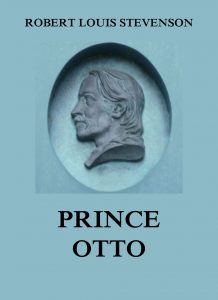Prince Otto – Robert Louis Stevenson
Stevenson’s second longer work of fiction is the greatest imaginable jump from the buccaneering story of Treasure Island with which he first came before a large public. Prince Otto is difficult to classify; it is not, as R. L. S. wrote, ‘ a romance, nor yet a comedy, nor yet a romantic comedy, but a kind of preparation of some of the elements of all these in a glass jar.’ It is, more than anything else, a piece of Stevenson’s paradoxical philosophy wrought into a story which, for one thing, has a very slender interest and, for another, is all the while very near to being overwhelmed by the rich beauty of its writing. Stevenson’s theme seems to be: Let us have done with this artificial life of courts which chokes a man’s healthy tastes, and is a breeding ground for vanity and scandal. Such is the interpretation which the story bears from his declaration to Henley that ‘ the romance lies precisely in the freeing of two spirits from these court intrigues.’ The delicacy with which this motive is woven into the picture of the affairs of Otto and his princess may justify the opinion, often expressed, that the book is the touchstone for the true Stevensonian.

Prince Otto
Format: Paperback.
Prince Otto.
ISBN: 9783849676025.
Available at amazon.com and other venues.
Biography of Robert Louis Stevenson (from Wikipedia):
Robert Louis Balfour Stevenson (13 November 1850 – 3 December 1894) was a Scottish novelist, poet, essayist, and travel writer. His most famous works are Treasure Island, Kidnapped, Strange Case of Dr Jekyll and Mr Hyde, and A Child’s Garden of Verses.
A literary celebrity during his lifetime, Stevenson now ranks as the 26th most translated author in the world. His works have been admired by many other writers, including Jorge Luis Borges, Bertolt Brecht, Marcel Proust, Arthur Conan Doyle, Henry James, Cesare Pavese, Emilio Salgari, Ernest Hemingway, Rudyard Kipling, Jack London, Vladimir Nabokov, J. M. Barrie, and G. K. Chesterton, who said of him that he “seemed to pick the right word up on the point of his pen, like a man playing spillikins”.
(The text of the last section was taken from a Wikipedia entry and is available under the Creative Commons Attribution-ShareAlike License.)
Publisher’s Note: This book is printed and distributed by Createspace a DBA of On-Demand Publishing LLC and is typically not available anywhere else than in stores owned and operated by Amazon or Createspace.
